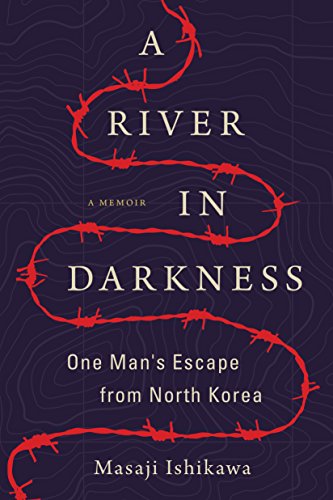One of my many reading goals for 2019 is to read more translated books. This goal is partially inspired by the book I wish to share here now. With a good translation (which is not guaranteed), a translated book offers readers a window into the mindset of another culture, to see how someone from someplace else views the world. This is one such book.
A River in Darkness was first published in Japan in 2000 by Masaji Ishikawa, recounting his life and eventual escape from North Korea. It was published under a pen-name to protect his family and friends still living there at the time. Born in Japan in 1947, Ishikawa was the only son of four children born to his Japanese mother and Korean father. His father was kidnapped from his home village at 14 by the Japanese during World War II to work in a factory in Japan, and was unable to go back after the war. Stranded and angry, Ishikawa’s father’s life fell into a pattern of drunkenness and violence that left both he and his family in deep poverty. So when an opportunity arose in 1960 to “return home” to N. Korea, Ishikawa’s father decided to resettle his family to this new “paradise on earth.”
Naturally, they found the conditions in N. Korea to be far worse than they were promised. Because of Ishikawa’s “returnee” status and his mixed heritage, the “natives” (as he came to call them) treated his family with nothing but scorn and contempt. This, on top of the other despicable conditions and situations he would find himself in, made both his and his family’s lives a misery. His descriptions of his 36 years in N. Korea are often heart-breaking, particularly his depiction of the famine they all suffered through in the lead-up to his escape in 1996. His escape really was on a knife edge for a few weeks. The efforts made by the Japanese Consulate office who got him to Tokyo without being captured would fit in perfectly with a political thriller movie.
The book’s final chapter ends on many somber notes, as he struggles to readjust to life in Japan and we learn what happened to at least some of his family members. It also ends with a bitterly political tone, as he voices his disgust with the Inter-Korean Summit of 2000. Indeed, the resettlement of Koreans from Japan to N. Korea was, and possibly still is, a testy political issue in Japan. It is something that Ishikawa brings up several times throughout the book, adding another layer to this already gripping story. It all makes for impactful reading.
Other Translated Books:
The Alchemist by Paulo Coelho
My Struggle by Karl Ove Knausgard
Convenience Store Woman by Sayaka Murata



